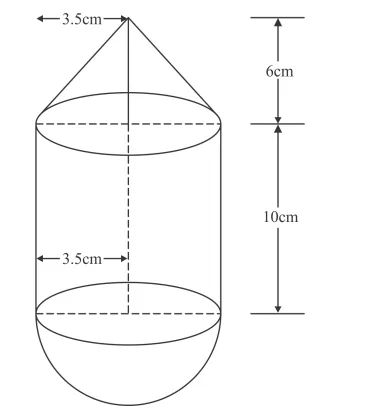A solid is in the form of a right circular cylinder, with a hemisphere at one end and a cone at the other end. The radius of the common base is 3.5 cm and the heights of the cylindrical and conical portions are 10 cm. and 6 cm, respectively. Find the total surface area of the solid. (Use π = 22/7)
We have the following diagram

For cone, we have
$r=3.5 \mathrm{~cm}$
$h=6 \mathrm{~cm}$
$l=\sqrt{r^{2}+h^{2}}$
$=\sqrt{3.5^{2}+6^{2}}$
$=6.95 \mathrm{~cm}$
Curved surface area of the cone is given as
$S_{1}=\pi r l$
$=\frac{22}{7} \times 3.5 \times 6.946$
$=76.408 \mathrm{~cm}^{2}$
For cylindrical part, we have
$r=3.5 \mathrm{~cm}$
$h=10 \mathrm{~cm}$
Curved surface area of the cylinder is
$S_{2}=2 \pi r h$
$=2 \times \frac{22}{7} \times 3.5 \times 10$
$=220 \mathrm{~cm}^{2}$
The surface area of the hemisphere is
$S_{3}=2 \pi r^{2}$
$=2 \times \frac{22}{7} \times 3.5^{2}$
$=77 \mathrm{~cm}^{2}$
Total surface area of the solid is given by
$S=S_{1}+S_{2}+S_{3}$
$=76.408+220+77$
$=373.408 \mathrm{~cm}^{2}$
Hence the total surface area of the solid is $S=373.408 \mathrm{~cm}^{2}$
